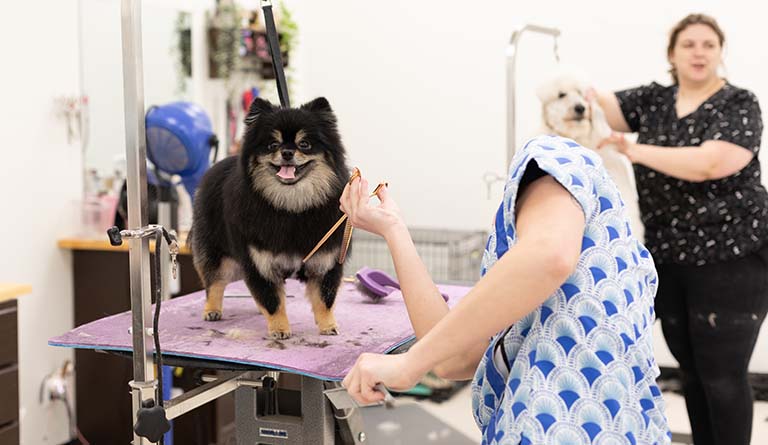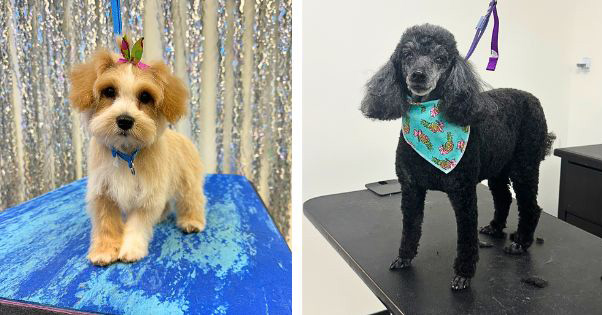Grooming is a vital aspect for every dog, and its grooming needs evolves throughout their life. From the early days of puppyhood to the senior years, understanding how to approach grooming based on your dog’s age is important. Proper grooming not only keeps your dog looking their best but also helps in maintaining their health, comfort and happiness. This blog explores essential grooming tips for puppies, guidelines for adult dogs and special considerations for senior pets to ensure they receive the care they need at every stage of their life.
Grooming Tips for Puppies: Introducing Grooming Early
The Importance of Early Grooming Habits
The main goal of grooming during puppyhood is to get your puppy accustomed to the process. This is incredibly important, as pets who become acquainted with professional groomers at a younger age behave far better and have far less anxiety than pets who begin grooming at an older age.
It’s important to avoid shaving or giving extreme cuts to a puppy’s coat, as most breeds develop their coarser, adult coat by six to eight months of age. Clipping a puppy’s hair too soon can affect the quality of their adult coat. Additionally, a puppy unfamiliar with clippers or shears may act skittish, making it more difficult for a groomer to perform an even haircut.
Introducing Your Puppy to Grooming at Home
To help your puppy feel comfortable with grooming, turn it into a fun experience. Start by gently handling their paws, playing with and massaging their toenails. Hold their tail while encouraging them to stand still. Get them used to having their ears, nose, mouth and face touched, including areas near their eyes.
Give your puppy a gentle massage and run your hands over their entire body, paying special attention to their legs and underbelly. Gradually introduce brushing by starting at the head and working down to the tail. Ask your groomer for advice on which brush is best for your puppy’s coat. Throughout the process, speak softly and offer plenty of praise to help build positive associations with grooming.
The First Visit to the Groomer
When it’s time for their first professional grooming visit, most salons offer a “puppy groom.” This basic service typically includes a bath, blow-dry, nail trimming, ear cleaning, brushing and a trim around the face, feet, and sanitary areas. The goal is to introduce your puppy to grooming tools and the overall process in a gentle and non-threatening way. Experts recommend bringing your puppy in for their first groom after they have their second round of shots which is around the 10-12 week mark.
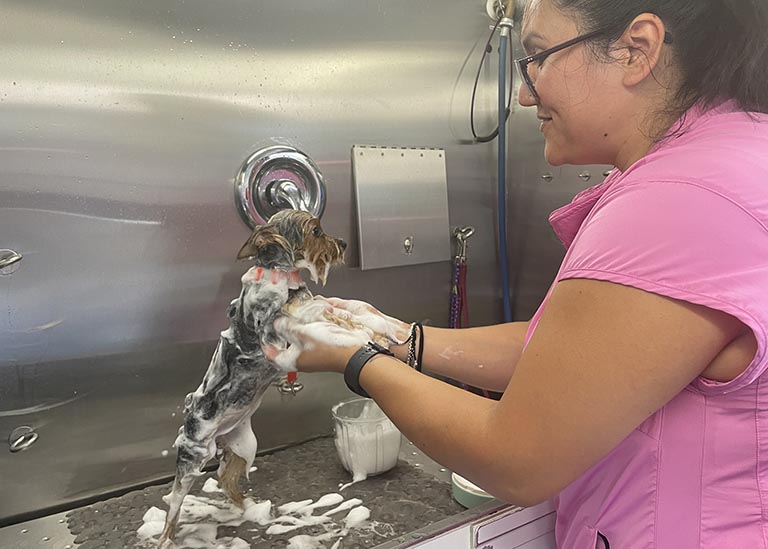
Grooming Needs for Adult Dogs
Create a Routine Grooming Schedule for Your Dog
Once your dog has their adult coat, it’s essential to maintain a routine grooming schedule. For dogs with long, thick, wavy or curly coats, we recommend grooming every 4-6 weeks. If at-home grooming isn’t an option, scheduling professional appointments every 2-4 weeks is ideal, especially for breeds prone to matting or those with curly or dense hair. Short-haired breeds like pugs, beagles and pit bulls can typically go 6-8 weeks between grooming sessions.
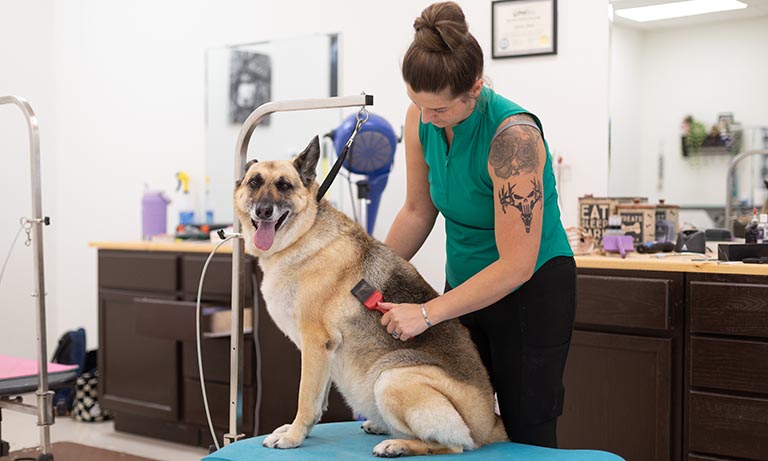
Adjusting Grooming for Aging Dogs
Mobility and Comfort
As dogs age, their grooming needs evolve, requiring special consideration for their mobility and comfort. Arthritis often affects senior dogs, leading to joint and muscle pain that can make grooming more challenging. Older dogs may struggle to stand for long periods on the grooming table or experience discomfort when lying in a kennel. To address this, groomers at Smoochie Pooch take frequent breaks and may even groom while the dog is seated or lying down, ensuring their comfort throughout the process. This approach may extend the grooming time or impact how evenly the groomer can work across the dog’s body, but we prioritize the well-being of your pet over perfection. We believe in never pushing a dog beyond their limits, ensuring a gentle and stress-free grooming experience for senior dogs.
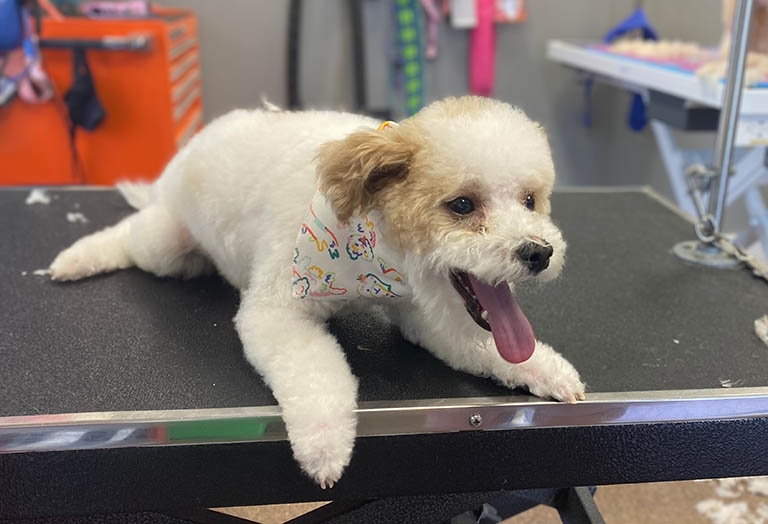
Skin and Coat Changes
Older dogs often experience thinning coats, which offer less protection, making their skin more prone to sensitivity and irritation. Their once-lush coat may become dry, brittle or patchy, while their skin can be more vulnerable to conditions like dryness, flakiness or hot spots. As dogs age, their skin becomes thinner and more delicate, making it more susceptible to injury. This increased fragility means that shaving out mats can be riskier, as the skin is more likely to tear or become damaged in the process. Leaving your dog’s hair slightly longer can offer additional protection and help maintain their coat’s health. Consistent, gentle brushing is also essential to prevent matting and ensure their coat stays manageable and comfortable.
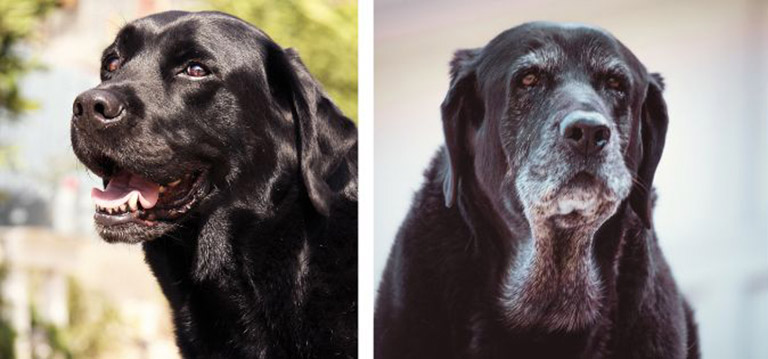
Health Monitoring
During grooming sessions, it’s essential to use the time to monitor your dog’s health. Request that your groomer checks for lumps, bumps or changes in the skin that could signal underlying health issues. Regular examinations can help identify problems like tumors, infections or skin conditions early, allowing for timely veterinary intervention. Incorporating these health checks into both your routine grooming and daily care ensures that your dog remains healthy and well-groomed. Additionally, be mindful to avoid nicking any lumps or warts during grooming to prevent further irritation.
Grooming Changes as Your Dog Ages
A dog’s age significantly impacts their grooming needs and experience. By starting grooming early with puppies, sticking to a consistent schedule for adult dogs and adapting techniques for senior pets, you can improve their comfort and health throughout their lives. Grooming is more than just maintaining appearance; it’s also about monitoring your dog’s overall health and ensuring they are comfortable. Whether you’re caring for a playful puppy or a gentle senior, a well-planned grooming routine plays a crucial role in enhancing your dog’s quality of life.
